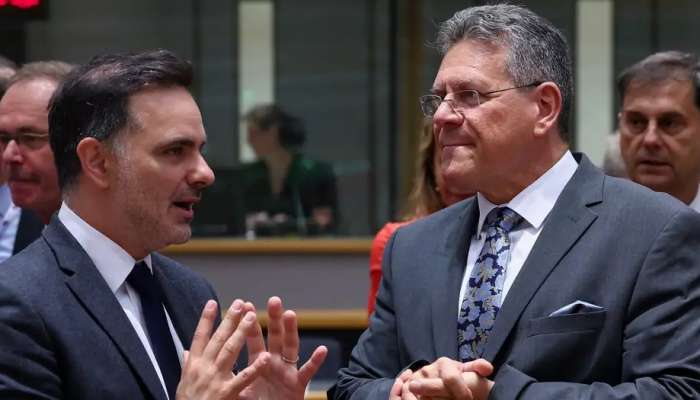
Brussels: EU trade chief Maros Sefcovic said on Monday that he believed the US was ready to continue ongoing trade negotiations despite an announcement by President Donald Trump that he would impose 30% trade tariffs on imports from the EU and Mexico from August 1 if no deal was reached.
His remarks come amid divisions within the bloc on how to confront the threat, with notably France calling for a hardball approach, while others call for caution with a mind to Europe's continued reliance on the US for defense.
What did the EU trade chief say about talks with the US?
Sefcovic, who as trade commissioner has been representing the EU's 27 member states during more than four weeks of talks between the two sides, said a deal was still the favored outcome, even while he acknowledged calls from countries like France for the bloc to toughen its stance.
In remarks made on arrival for talks in Brussels with bloc ministers, he said the 30% tariff threatened by Trump would make it "almost impossible to continue" trade with the US, which is currently worth €4.4 billion ($5.15 billion) a day.
Sefcovic said he and his negotiating team had felt a deal was imminent during the trade talks.
"The feeling on our side was that we are very close to an agreement," he said.
But he said the turmoil created by the tariff threat should be ended, adding that the bloc was prepared for "all outcomes."
"The current uncertainty caused by unjustified tariffs cannot persist indefinitely," Sefcovic told reporters, adding that "well-considered, proportionate countermeasures" were still on the table if no deal could be reached.
How might the EU react to Trump's tariffs?
European Commission President Ursula von der Leyen on Sunday delayed — as a sign of good will — a package of retaliatory measures over previous US tariffs on steel and aluminium that was due to kick in on Monday.
But diplomats said another set of reprisal measures that could be launched if the 30% tariffs go ahead will be presented to trade ministers on Monday.
France's trade minister. Laurent Saint-Martin, said there should be "no taboos" in any retaliatory plans, adding that Trump's announcement meant that the bloc had to reconsider its tactis.
"If you hold anything back, you are not strengthening your hand in negotiations," he said at the Brussels talks. "Obviously, the situation since Saturday requires us to change our strategy."
Denmark's foreign minister Lars Lokke Rasmussen, whose country currently holds the EU presidency, also called for a firmer approach.
"We want a deal but there's an old saying: 'if you want peace, you have to prepare for war'," he said ahead of the talks.
Merz says will work 'intensively' for deal
German Chancellor Friedrich Merz has said the 2 1/2 weeks remaining till the August 1 deadline had to be used to reach a deal.
"I will be working on this really intensively," he told German public broadcaster ARD in an interview on Sunday.
He said that he, like French President Emmanuel Macron, was in favor of massive counter-tariffs if Trump's threat became reality, but "not before August 1."
Merz gave an urgent warning about the consequences for the German economy if no deal was reached.
"If that happened, then we could forget about much of our effort with regard to economic policy, because it would overshadow everything and hit Germany's export economy in its core."